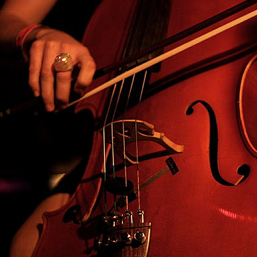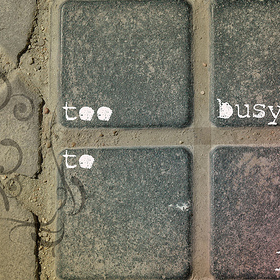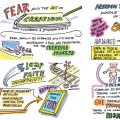The 14,600 Hours to Virtuosity

“A little knowledge is a dangerous thing…”
-Alexander Pope, 1709
***
Thanks to the use of Frequent Flyer Miles, I flew back to New York City from Bucharest last year in Delta’s nice BusinessElite cabin. Hanging out in the airline lounge before the flight, I met up with another traveler, a professional musician from New York named Hannah Chang.
Hannah was the only person I had ever met that was carrying tickets for two confirmed BusinessElite seats all to herself. Technically, she didn’t use both of them for herself—instead, one was for her and one was for her cello, which traveled with her wherever she went.
Hannah told me that the Bucharest Symphony Orchestra had commissioned her to come over and play one 90-minute concert. She came in on the flight two days ago, rehearsed the next morning, played the concert, went back to her suite at the Marriott, and now was flying back to the states before heading to Argentina the following week.
Hannah is a real-life virtuoso, a child performer who grew up in Korea, moved to New York, and turned pro. She travels all over the world, usually for a couple nights at a time just like in Romania, and gets paid to spend hours and hours every day practicing her scales and her Mozart.
The Cost of Being a Highly Specialized Expert
Flying home with Hannah and her BizElite cello made me think about virtuosity. What does it take to be a real expert, I wondered, and what do you get in return?
I just checked the price of a Business Elite seat on the Bucharest-JFK route. The cheapest one I could find, manipulating the dates a bit, was$2,835. Multiply that by two, since there are no Business Class discounts for cellos as far as I know, and you’ve got a minimum of $5,670 that the orchestra needs to pay Ms. Chang to come over and play for 90 minutes. And of course, that’s not counting her performance fee, which is most likely in the low five figure range.
If you want people to drop $5,670 on two Business Class plane tickets for you to swing into Bucharest and play the cello for a couple of hours, you have to provide some serious value. You have to be able to do something that very few other people in the world can do.
The way you do that is by becoming a virtuoso.
The time cost of becoming a virtuoso—which I’m defining here simply as a measure of extremely high expertise—is about 10 years of consistent training for at least several hours a day. This is the consensus view from a wide scientific literature on virtuosos from various disciplines.
Roughly, this breaks down to 14,600 hours over the course of a decade (4 hours a day, no weekends or holidays). According to experts who study the experts, If you spend approximately 14,600 hours practicing the cello, learning to be a surgeon, playing chess, or doing any activity that has a progressive learning scale and can be evaluated by other experts, you’ll achieve the status of being a virtuoso.
Yes, there are some disclaimers, and the most important one is that you have to have somewhat of a talent at playing chess or cello to begin with. But most virtuosos are not innate geniuses; they are instead highly disciplined individuals.
The secret they share across their diverse fields is that with an investment of enough time, you too can get a Business Elite ticket for your cello and a two-night, high-paying trip to Romania. All that’s holding you back is about 14,000 hours.
The Case for Virtuosity
Aside from getting paid to fly around the world for one-night concerts, there are other long-term benefits to becoming a virtuoso.
Perhaps most interestingly, virtuosity can lead to fame and the ability to branch out after you’ve achieved the initial recognition. The strange phenomenon of being considered a “guru” in a highly-specialized niche is that once you are known as one kind of an expert, all of a sudden you’ll start seeing people look to you for your opinions about other, seemingly unrelated subjects. It may not seem fair to other people who know more about the other subjects, but it’s just how the world works.
For example, look at Steven Levitt, the guy who wrote Freakonomics. In his New York Times blog, he writes about all kinds of random stuff. A sampling of his recent writing turns out articles about the status of the penny, baseball, and global warming. Are all of these topics really that connected to behavioral economics, his base field of expertise? Perhaps in a far-fetched way they are, but if he hadn’t established his status as an authority figure, the chances that the NYT would come calling are pretty slim. Economists aren’t exactly a scarce resource in the world of commentators these days.
(I’m not saying Levitt is unqualified to write about random subjects. In fact, his analysis is usually excellent. What I’m saying is that he is now regarded by his audience as an expert on all kinds of things that have nothing to do with his original subject.)
The same is true with Thomas Friedman, who started out as a journalist covering the Beirut-to-Jerusalem beat and now opines about anything related to globalization, politics, and world affairs. He’s not always right, but he always has a huge audience ready to dissect and argue about every word he writes.
Traditional academics and other people who try to preserve their own claim to expertise love to hate people like Levitt and Friedman. They can’t stand the fact that others are taking an insiders’ game to the masses and capitalizing on their status as recognized experts.
Therefore, you can become an expert in something and catapult to fame in something else. But wait a minute… is that what you really want to do? Despite the clear advantages, I believe it’s better for most of us to skip out on virtuosity.
The Case Against Virtuosity
What’s not to like about being a virtuoso?
First, the true virtuoso’s life is a lonely one. Four hours a day is the minimum practice time required over a full decade. Many virtuosos practice much more than that, and the habit of valuing practice over any other activities is ingrained from an early age. Some virtuosos may be able to live normal lives complete with a good balance of social activities, but many others view the absence of close friendships as a sacrifice for the practice schedule.
Virtuosity also requires intense, sustainable concentration skills. Many of us from the A.D.D. generation, including me, are not cut out for this. I have a hard time concentrating on any one task for more than 20 minutes at a time. Despite the current thinking on multitasking, I am a consummate multitasker and don’t “single-task” well. I think I could probably train myself to concentrate for longer periods of time, but I don’t think I’d ever be up for 4-6 hours of the same kind of activity day in and day out with no breaks.
Intense specialization prevents you from learning a lot of other things. If you want to be really, really great at something, it’s possible—it will just take a set number of hours that you can’t do anything else with. Before you tune up the cello, you should carefully think about how good you really want to be.
It’s a deceptively simple consideration. To achieve virtuosity requires an average of 14,600 hours. But to merely be good requires much less. How much less depends on who you are, what you’re studying, and where you draw the line at being “good enough.”
Foreign Languages
I don’t think I will ever become completely fluent in French, my second language. The attainment of true fluency in a language not spoken in childhood takes a big commitment—usually about 4-5 years of consistent, daily study (although only about 1-2 hours a day is needed for most people). For languages that are more difficult for English speakers, like Mandarin Chinese, Arabic, and Hindi, closer to 6-7 years is required. (You can read more about this here.)
But if fluency is a daunting challenge, proficiency is not. For most people willing to commit to it, learning an additional language to the point of being able to speak, read, and understand at a functional level is much easier. For me, I’d rather be relatively comfortable in a few languages than completely fluent in one additional language.
Musicianship
The same principle held true when I was learning to play jazz music about seven years ago. My main instrument was bass (electric and acoustic), but I also played piano and several other instruments. With the other instruments, I mostly wanted to learn the basics—not become a virtuoso, or even highly proficient. I just wanted to learn to play the saxophone, clarinet, cello, drums, and various other instruments to a basic level. Once I achieved that, I moved on—and what I learned was helpful in my main goal of becoming a well-rounded jazz bass player.
***
A lot of people know the first line of this quote from the English poet Alexander Pope:
“A little learning is a dangerous thing…”
Reading the rest of it puts it into better context:
“A little learning is a dangerous thing; drink deep, or taste not the Pierian spring: there shallow draughts intoxicate the brain, and drinking largely sobers us again.”
Ignoring the archaic English words (Pope wrote it in 1709), this proverb basically means:
“Don’t just learn a little, because then you may think you know more than you really do. Better to learn a lot, and then you’ll be more qualified to offer your opinions.”
Whether you choose to learn a lot about a lot of things, or achieve true mastery of one subject, don’t neglect your learning.
Drink deep.
###
Image: Gwen








20 Comments
Hi there. I found your website through Problogger, and have been reading a lot of your articles today. I think you’ve got an amazing goal (with a worthy website!) and ‘ll make sure I visit this site from time to time.
This is great, as usual.
I started to worry that you were endorsing virtuosity and at least four hours a day dedicated to a single subject. Like you, the “A.D.D.” (or simply the Teenage-Human) part of me screeched in protest.
I’m glad I kept reading, though. I’d rather learn a little of everything than just what’s most profitable.
There must be some merit to the idea of throwing yourself into a single subject or art-form in order to become the “best” at it. I have a buddy of this mindset. I don’t really know yet. It doesn’t appeal to me personally.
I guess we’re all unique, even in our similar quest to be remarkable.
This is a good article. Shakespeare and Oscar Wilde spent copious amounts mastering the art of writing. Great musicians/artistes spend a lot of time making music. 10 years is not a long time..you will still be around. Great site
I found my way here from one of your messages leading up to the launch of the Secret Connection of Art and Money. The bottom line is that, yes, I want to be a virtuoso. This reminds me that I have much practicing — focused effort — yet to do. Thanks for the reminder to keep working.
Excellent stuff as usual! Your point is well taken regarding the lonely life of some virtuosos, but remember that many are more in love with their art than human relations. Some would rather spend hours with a math book than their spouses.
Interesting article. I read a similar thing in the Sunday Times a few months back, and I’m currently typing my response with a good few tabs open and The Replacements blaring out in the background. 😛
The idea of having to do hours of practice to become a virtuoso is pretty firmly backed up by evidence. That it goes against the hectic Western lifestyle is a pretty stark comment on our society, where life is driven by business that wants people to have profitable skills and not necessarily extraordinary ones.
The truth is that if you tell a kid (or an adult for that matter) they are going to have to devote 10,000 hours to working on something before they will be exceptional, that is going to have almost no bearing on whether or not they will do what it takes.
Yes, a very disciplined adult or child’s parent might take the steps necesary to force themselves to do the practice, but I think that’s a pretty bad idea. From what I’ve found when it comes to a passion for something the time finds you, not the other way round. If you truly want to be a virtuoso it will happen, so long as you let yourself slack off things that don’t interest you and give yourself the time and tools to become highly skilled.
I was lucky in that I was born into a creative family. I have always made art. I bucked, however, at trying to make a living at it initially.
I ended up going to Naturopathic medical school and then specializing in an even more obscure domain, Homeopathy. Coming full circle back to art and making money from it….is exciting. I’m getting pretty close to 10,000 hours of each. (love Gladwell’s books, haven’t read his most recent yet.)
I remember a teacher once saying it’s hard to be good at one thing, nevermind many things. That idea was planted long ago. I’m so impatient and ADD (and I’m in my 40’s) that it took me ’til now to reap the benefit of having gone back, over and over and over, to those two things I love most.
In the end, that thing that gets you excited is the only one that will stick, is what I’ve learned. I never get bored of those two things, and I was excited from the first minute. Blink!
I disagree somewhat with the 10,000 hours (or 14,000) hours to greatness assumption.
The trick is that some professions have a greater scarcity of people putting in that 10,000 hours which colors what is perceived as out of the ordinary. I am a software engineer, and have been working at it for, I estimate… probably 25,000 hours or so. I’m pretty good, but am I a virtuoso? Well, the thing is engineers with 25,000 hours logged doing that kind of work isn’t that rare.
In fact people with 25,000 hours playing the cello are much rarer since it’s non-conformist and generally not easy to make a living from.
So, the idea of virtuosity is making it sound a bit more romantic than it really is. You could spend 30,000 hours on something, but if the level of competition is high within that area, no one would see it as special.
In a nutshell, it’s better to focus on doing something different, rather than be a beancounter trying to hit the magical 10,000 hours threshold.
Hello, I have just now found this website whilst I’m hunting around online as I am looking for some info on electric cellos!. I think it’s a very interesting website so I bookmarked your site and intend to revisit you another day to give it a better browse when I can give it more time.
Isn’t it true that those who are so great at what they do make it seem so easy? That’s what people forget, or don’t realize…the hours and discipline it took to make “it” seem easy!
Speaking of Levitt, we had to read a couple of his articles for my Marketing Management class in an MBA program this summer. I liked “Marketing Myopia”(1975), and “The Globolization or Markets”(2004).The first article is said to be a benchmark in the world of marketing.
Because of that and many other accomplishments,Levitt is highly respected and quoted.What a way to be a a Virtuoso!
I envy him,lol.
Anyway thanks for writing such informative and mind nourishing stuff:)
In the martial art of Taekwondo we say that 10 years (10,000 hours) is required to achieve Olympic level performance. This may be less than 14600 hours because it’s a little more demanding on the body than say, cello practice. In fact the most difficult thing (aside from 10-year motivation) is injury management. Any such athlete will sprain break and tear many things, so returning to competition time and time again is a challenge.
It’s not just a question of 14,600 hours in 10 years. But intelligently spent 14,600 hours.
And in reality its more than 10 years, but a lifetime of searching….
It is a case of whatever your finds to do,do it well.
I have fun with, cause I found exactly what I was taking a look for.
You have ended my 4 day long hunt! God Bless you man. Have a great day.
Bye
Here is my page – top e cigarette product
Your comments are welcome! Please be nice and use your real name.
If you have a website, include it in the website field (not in the text of the comment).
Want to see your photo in the comments? Visit Gravatar.com to get one.